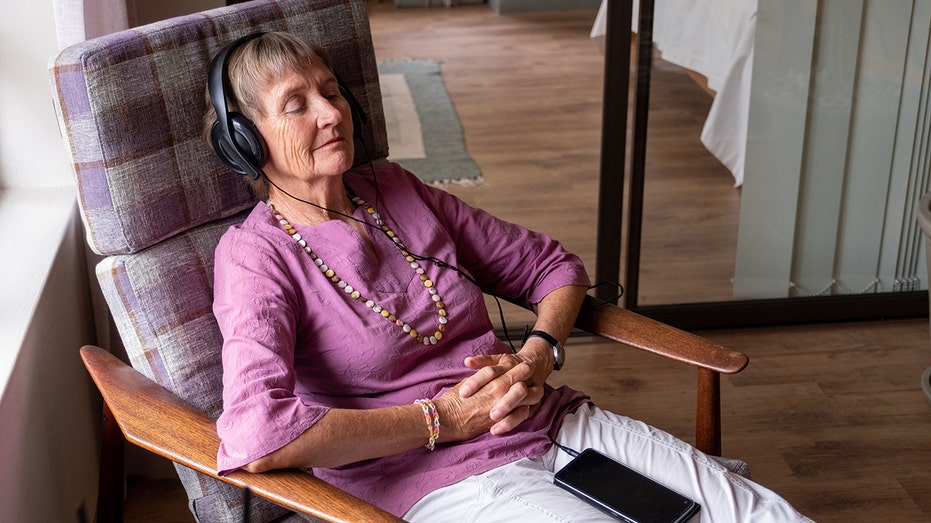Top Stories
Listening to Music Cuts Dementia Risk by 40% for Seniors

UPDATE: A groundbreaking study from Monash University in Melbourne, Australia, reveals that listening to music can reduce the risk of dementia by nearly 40% for adults aged 70 and older. This urgent finding underscores the potential of music as a protective measure against cognitive decline.
The research, published last month in the International Journal of Geriatric Psychiatry, tracked over 10,800 seniors for several years. Those who regularly listened to music demonstrated a 39% lower likelihood of developing dementia, while those who played musical instruments experienced a 35% reduction in risk. The study highlights the critical role of music in maintaining cognitive health.
According to lead researchers, Emma Jaffa and Professor Joanne Ryan, engaging in both listening and playing music significantly enhances brain health. They found that doing both activities not only decreases the risk of dementia but also improves memory performance and reduces the chances of mild cognitive impairment by 22%.
“With no cure currently available for dementia, identifying strategies to prevent or delay its onset is vital,” stated Professor Ryan. She emphasized that cognitive aging is influenced by environmental and lifestyle choices, not just genetics and age.
The study’s findings are particularly relevant as dementia currently affects approximately 57 million people globally, according to the World Health Organization. As the global population ages, the importance of accessible interventions like music becomes increasingly clear.
While the research indicates a strong correlation between musical engagement and cognitive health, the authors caution that causation cannot be established definitively. “Music activities may serve as an accessible strategy for maintaining cognitive health in older adults,” they noted, recognizing the mixed results from previous studies on mental stimulation.
The benefits of music were most pronounced among older adults with higher education levels—those who completed at least 16 years of schooling—while results varied for those with less education. This suggests that educational background may enhance the protective effects of musical engagement.
Experts like Dr. Morten Scheibye-Knudsen, an associate professor of aging at the University of Copenhagen, encourage mental stimulation through activities like music, although he acknowledges that the scientific understanding remains unsettled. “While training your brain is advised, the data on its effectiveness is not entirely clear,” he remarked. However, he highlighted the social benefits of playing an instrument, which fosters important interactions as people age.
As this study gains attention, it opens the door for further exploration into how simple lifestyle changes can significantly impact cognitive health. The urgent message is clear: integrating music into daily life could be a powerful tool in the fight against dementia.
Stay tuned for more updates as researchers continue to explore the connection between music and brain health.
-

 World2 weeks ago
World2 weeks agoGlobal Air Forces Ranked by Annual Defense Budgets in 2025
-

 World3 weeks ago
World3 weeks agoMass Production of F-35 Fighter Jet Drives Down Costs
-

 Top Stories2 weeks ago
Top Stories2 weeks agoNew ‘Star Trek: Voyager’ Game Demo Released, Players Test Limits
-

 Top Stories2 weeks ago
Top Stories2 weeks agoDirecTV to Launch AI-Driven Ads with User Likenesses in 2026
-

 Science2 weeks ago
Science2 weeks agoTime Crystals Revolutionize Quantum Computing Potential
-

 World2 weeks ago
World2 weeks agoElectrification Challenges Demand Advanced Multiphysics Modeling
-

 Entertainment2 weeks ago
Entertainment2 weeks agoFreeport Art Gallery Transforms Waste into Creative Masterpieces
-

 Health2 weeks ago
Health2 weeks agoGavin Newsom Critiques Trump’s Health and National Guard Plans
-

 Lifestyle2 weeks ago
Lifestyle2 weeks agoLia Thomas Honored with ‘Voice of Inspiration’ Award at Dodgers Event
-

 Lifestyle2 weeks ago
Lifestyle2 weeks agoDiscover Reese Witherspoon’s Chic Dining Room Style for Under $25
-

 Entertainment2 weeks ago
Entertainment2 weeks agoFast & Furious Coaster Hits the Track at Universal Studios
-

 Science2 weeks ago
Science2 weeks agoWaning Crescent Moon: What to Expect on October 17









